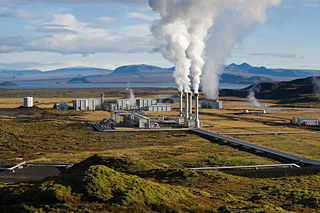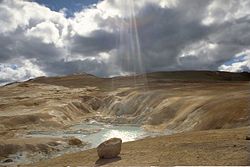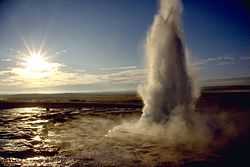Unbelievable figure - 90% of the energy from renewable sources!!! Dependence on oil decreased from 8.9% in 2000 to 6.7% in 2006

While the whole world is panicking because of oil prices, global warming and a variety of environmental problems, there is one country that has completely freed itself from its dependence on oil and based almost all of its energy sources on renewable energy sources! This is an extraordinary story about a country that has harnessed the forces of nature to produce green energy from natural sources and thereby freed itself from dependence on oil.
Iceland is at the forefront of geothermal research, it has become the first country in the world that does not depend on external sources for its energy production. 90% of its energy comes from renewable sources and the rest from oil and coal. Today, 99.9% of the electricity produced in the country originates from renewable sources, of which about 80% is produced from hydroelectric energy (using the flow of water to turn the turbine wheel) and another 20% from geothermal energy (using geothermal heat to create steam to turn the turbine). Besides the production of electricity, the frozen island provides its population with a special system of heating houses. In contrast to Europe, which bases the heating of houses on Russian gas, about 90% of the parents' houses in Iceland are heated by geothermal sources.

The island is considered geologically young and has a lot of tectonic and volcanic activity, as a result it is prone to earthquakes. The island has over 200 active volcanoes, over 600 hot springs and over 20 natural steam fields at high temperatures (between 150°C and 250°C). The geological activity is a nuisance to the population and the government, but history shows that trying to make the best of a bad situation can return quite surprising results.
The government of Iceland adopted a patent of a farmer who in 1907 built a pipe to transport steam to heat his house. In 1930, the method was used to heat a hospital, a school and 60 private homes. In 1943, a district heating corporation began operating and in 1945, 2,850 homes were connected to a geothermal power plant. As mentioned, today about 90% of the houses in the country are heated by geothermal sources.
The snowy island contains a lot of ice and snow. The heat generated by the volcanic activity melts the snow and creates hundreds of kilometers of rivers that flow down the mountain towards the ocean. Similar to the Dutch, who very successfully used the wind for their needs, the Icelanders also decided to try harnessing the power of water to turn turbines. In 1904, the first hydroelectric power station was established. In the following decades, more and more hydroelectric power plants were built, and slowly the country almost completely stopped burning oil and coal to create steam to drive the turbine. Today, about 80% of the electrical energy is produced in hydroelectric power plants.

Throughout the last century, the government encouraged the transition to renewable energy, considerable sums were invested in research and development, in examining the feasibility of projects, and in assistance in other areas. The government's involvement was so successful that private entities no longer needed government help and continued the research themselves.
The transition from an oil-based economy to an economy based on renewable energy saved the country over 8 billion dollars in the years 1970-2000, and reduced carbon dioxide emissions by 37%. The Icelandic government believes that there are many more unrecognized geothermal sources that can be exploited in the future.
It is true that the geographical environment of Iceland cannot be compared to the geographical environment of Israel (or any other country for that matter), but it can be said that when the state increases its involvement in certain areas, stimulates the industry and supports it - impressive results can be achieved. The Icelanders themselves did not expect that investment in renewable energy sources would be so successful and free them from dependence on oil. The State of Israel should learn from the Icelanders, we have our advantages and we must use them to reduce our dependence on oil.
More information

26 תגובות
Energy Savings http://www.gadir-systems.co.il/
How many people are there in Iceland?
Now, after the collapse of Iceland, we know what the "renewable sources" of energy are - bank accounts of British suckers!
On the other hand, they tried to recycle money from the capital market bubble
And they were so successful after the depositors who were lured in the UK lost their money that the UK threatened them with no less anti-terror laws
At my house, I produce more than 90% of the energy using solar energy: http://www.solari.co.il
(-) Elhanan.
The Icelandic krona has weakened this year, and inflation has soared to a level that forced the Icelandic central bank to raise interest rates last month to a record high of 15%.
The credit rating agencies Fitch and S&P said this week that there is a fear that the banks in Iceland will have difficulty obtaining financing, and will burden the country in the coming year. Fitch lowered the island's credit rating from "stable" to "negative". S&P put Iceland on a watch list "with negative consequences".
A petition to the Knesset will never be good
We didn't get much out of talking a lot, the Jews were always strong in talking, what really needs to be done is to inform the public and make them aware that it is possible, it is economic, it saves the environment and it is possible in our lifetime, a petition to the Knesset will always be good...
For Yogev (number 14), the area of Israel is 5 times smaller than the area of Iceland, but the population of Israel is 25 times larger than the population of Iceland. But if we put these dry figures aside, the other surfers are right when they say that everything comes from above, and if the government does not commit to it - nothing dear.
Even if we don't have natural resources like rivers and geothermal activity, there are other sources. What about the wind in Hermon? What if the utilization of wave energy (a field in which Israel is a world leader)? What about the sun in the Negev? We have an abundant imagination, and we have a first-class human resource, all that is needed is the will and the government's intention.
With all due respect... and there is respect... the State of Israel does not have such natural resources that can be used to create energy. No rivers and no geothermal energy.
And what about the planning that once existed for the "Sea Canal" - utilizing the height differences for energy, will not only help from a green perspective but also for the development of the Negev.
Michael and Sabdarmish Netzach,
Thank you very much for your response, the reason I am so interested is that I have always tried to create a situation of doing "maximum of minimum" like for example solar energy.
And here is a good example. Admittedly, it is not that effective because it is a relatively small population, but this is indeed the direction we should follow.
And add to that the fact that Iceland has no army and no police.
And here - enough solar energy to support the country three times, but they prefer to invest in oil and weapons.
Hamat Geder, Hamat Geder, Hamat Geder, Hamat Geder, Hamat Geder
No. 9 and 10 are XNUMX percent correct. When will we hear about projects in Israel that the government will do a favor and approve a budget and approvals, what if it's a wind chimney and all the ideas that seem to never come true in my lifetime (at least not in my lifetime)
Gil at number 9 writes about this.
In my opinion, the utilization of solar energy in the State of Israel for heating purposes,
greater than the utilization of geothermal energy in Iceland for heating purposes.
Therefore, you should offer Icelanders the use of solar collectors!!!
Hahahahahahahaha!!!
Apparently someone is trying to sell us ice
He just forgot to add some unimportant details
The area of Iceland is more than 4 times that of the State of Israel
The number of residents there is only about 300 thousand (less than the city of Tel Aviv),
A really undeveloped country with a wild landscape
The main import branches are: machinery, equipment, petroleum products, food and textiles.
The main sector in Iceland's economy is the fishing industry
They make sure that in 50 years at best there will be no fish in the sea.
If all the volcanic and geothermal activity is a lot, it's clear that they don't need either oil or ice 🙂
Response to Jobev from number 6
In all 12 years of my studies I was also very interested in the field of geography and environmental development, in between I did 5 units in geography and in the army I was an observer in some of the services, and when the moment came to enroll in academic studies I enrolled in Ahava College (academic responsibility of Ben Gurion University) in the department of "Geography and Environmental Development". This is the topic that actually deals with what you are interested in learning, so I recommend that you go to the following link:
http://www.geog.bgu.ac.il There are all the details about the department.
, good luck to you!! 🙂
Yogev:
I think it's more a matter of awareness than a specific profession.
There is a profession called "environmental sciences" but this profession leads you more to monitoring and analyzing reality and less to innovations that will revolutionize it.
The revolutions come rather from innovations in the fields of chemistry, materials science, biology, physics, earth and climate sciences (including geo engineering) and engineering in general (which also deals with the development of more efficient ways to create and convert energy and other resources) and in the field of urban engineering that tries to integrate these technologies into our lives through advanced infrastructures . But, and this is the main thing in my opinion, in order to bring awareness and motivation to those necessary revolutions.
What a pleasure to hear!!
In my opinion, this is how it should be to create energy from renewable natural sources -> there is nothing better than that!
If I want to work in this profession, what should I study?
Thanks for your attention, it will be fixed later today. The intention was to emphasize the fact that the Dutch took advantage of the forces of nature (wind), as did the Icelanders (water).
I have a similar experience from a recent trip to Austria.
We stayed about a week in the Salzburg area and traveled by bicycle the whole time.
The country is prepared for such trips in an exceptional way, almost everywhere there are parallel to the roads paved bicycle tracks. The only places where there are no such tracks are on the roads leading to and through villages that have something like five to ten farms and on these roads no cars travel anyway.
Apart from the travelers, you see there all the time a lot of ordinary citizens of all ages who travel by bicycle between home and work and between these and the places of entertainment and the shops.
All in all, there is a lot of awareness of the environment in other matters as well - starting with charging money for packaging bags in stores and ending with the fact that everyone occasionally takes a broom and cleans the sidewalk next to their house.
The strongest and most correct investment will be, as Michael already hinted, in bike lanes. As someone who returned from a stay of several years in Germany, I understand today that when there is a proper and good infrastructure there will also be use. In the city where I lived he rode a bicycle! Old men and women also rode bicycles. Definitely a renewable energy source that significantly reduces greenhouse gas emissions. This chutzma also makes the Germans slim and athletic, which is also nice (and maybe saves billions for the health system?)
Greetings friends
Ami Bachar
Expansion according to Yehuda:
In the Netherlands there is absolutely no possibility of creating energy by water that comes down from the mountains, simply because there are no mountains. It is not for nothing that the country is known for being a paradise for bicycles.
The similarity that does exist is in the utilization of renewable energy sources (such as the wind and leg muscles).
a quote:
"Like the Dutch, the Icelanders also decided to harness the power of water to turn turbines." End quote.
As far as I know the Dutch use wind energy and not water energy.
Sabdarmish Yehuda